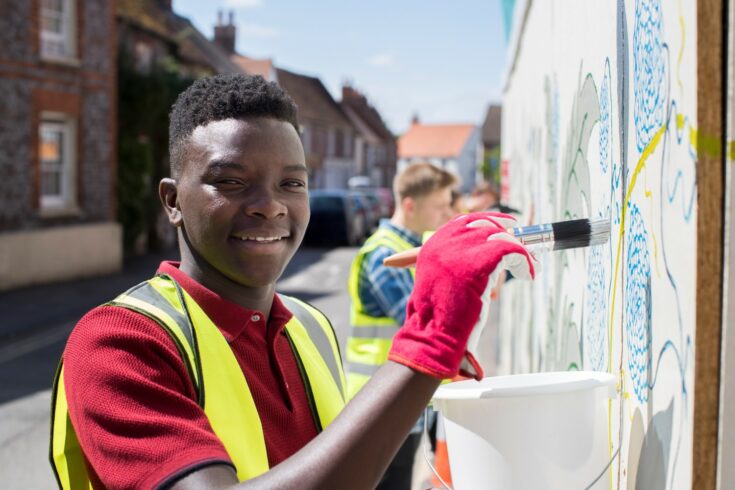The power of culture post-COVID
Culture connects us like nothing else and the pandemic has reminded us that place and participation matters now more than ever. Before the pandemic, the UK’s creative industries were booming.
The Arts and Humanities Research Council’s (AHRC) Creative Industries Deep Dive report reminds us that by 2020 these sectors were making:
a greater contribution to the UK economy than to any comparable nation.
With annual gross value added (GVA) of £115 billion, providing 2.1 million jobs and growing at three times the rate of the economy overall since 2008, the size and economic weight of the creative industries is still surprising to many.
But any level of surprise that the sector is larger (in terms of GVA) than the life sciences, automotive, aerospace and oil and gas sectors combined is understandable, because the idea of the creative industries as an industrial rather than a cultural sector is relatively ‘new’, being only conceptualised and defined in the last 25 years.
The challenge
The challenge is to preserve what we have and create new culture, as well as ensuring that culture is by all, and for all, going forwards. That requires a better understanding of:
- collaboration
- partnership working
- the creation of capacity.
The new AHRC Creative Communities programme develops the potential for arts and humanities in fostering and enabling creative communities.
Its mission is to capture the inspiring explosion of collaboration and connectivity that can unlock the full potential of our great arts and culture. This will create a stronger, fairer economy and society across the regions and nations of the UK.
What is a creative community?
A creative community describes a group of people who come together around a shared challenge or theme to create, act and share, or a concentration of creatives operating in a shared locale.
Creative communities operate on relationships of trust, shared goals and objectives and generate spill-over benefits for people and communities. By identifying, responding to, and articulating their own needs, creative communities use partnership working to open up opportunity. They co-design and co-deliver interventions, and challenge received ways of thinking about some of the most significant challenges facing society today.
Generating a knowledge base
The post-COVID context and the challenges facing us today require a deep dive review that will generate a knowledge base of existing activities and initiatives. It will also generate recommendations and opportunities for new collaborations in culture and innovation that genuinely promote equality, diversity and inclusion through equitable partnership working.
AHRC has a deep and profound interest in exploring how the areas of work it sponsors can make a tangible difference and create real changes in society. But we have a lot more to learn. There is a renewed need today to position AHRC as a funder to better support this type of activity and work right across the expanded research ecosystem.
Meeting place and impact agendas
The Creative Communities programme will lift AHRC activities to meet place and impact agendas across research and public engagement. It will conduct the first nation-wide sectoral deep dive on ‘what works’ in co-designing, co-delivering and co-evaluating cultural and creative partnerships across a diverse range of educational, third sector and business organisations.
The programme builds on our 2020 Boundless Creativity report with the Department for Digital, Culture, Media and Sport (DCMS). The new programme leads significant outward facing research and engagement work to unite the AHRC quartiles of vision in new discovery research. It will generate impactful public policy recommendations and help inform future funding strategies.
The Creative Communities programme
Partnerships and knowledge exchange can play a central role in development initiatives. They have the potential to maximise resources, enhance competitiveness and opportunities and build resilience in freelance communities to tackle the challenges that lie ahead.
The Creative Communities programme will profile case studies of how communities are co-creating opportunities for industry, academics and creatives. They will work alongside creative industries organisations and leaders as solution finders to future challenges facing the sector.
It will ask how these partnerships are generating evidence-based approaches to ‘value’ and return and help drive growth in key sectors. This includes the role of creative industries and creative economy in attracting businesses and investment to the regions and nations.
New dynamic evidence base
The programme will produce a new report that will present a new dynamic evidence base drawn from across the regions and nations of the UK and that will inform future AHRC funding. It will profile examples of good practice and make recommendations that will highlight the cross-council reach of our research and aspiration as a funder of the future.
The Creative Communities report will aim to capture for the first time an account of the innovation ecosystems operating across our regions and nations. It will consider how, where and with what effect these can be scaled, shared or supported to engage the public with research through new methods of stakeholder working and community led insight gathering.
It will explore issues around the role of arts and humanities in supporting the place and levelling up agendas, and cultural partnership and impact. It will examine how creative partnerships can facilitate all elements of this innovation journey, from discovery and invention, through to development and adoption.
Boundless possibilities
Research has visibly changed our world through the last 12 months, but the value of the vaccine is only one element of the story.
The soft power of culture to help us sustain through and success beyond the pandemic is a story that now needs to be told. There is a need to more accurately capture the ‘value’ of culture, something that emerged from the AHRC and DCMS Boundless Creativity report. It is a clear signal to re-assess how we measure, understand and assess value within the cultural sector going forwards.
Culture sustained us during the pandemic, and in a post-pandemic world it can help us get up off our knees together. By bringing people closer to opportunity, to gain skills, retrain, and retain talent in the regions and nations of the UK, culture is uniquely placed to generate spill-over benefits. From high street regeneration to public health targets and pride in place.
Creative Communities will generate a much-needed new knowledge base of existing activities and initiatives. It will also generate recommendations and opportunities for new collaborations in culture and innovation that genuinely promote equality, diversity and inclusion through equitable partnership. It will work to ensure that culture is by all, and for all, now and in the future.
Get involved
If you are interested in getting involved with the Creative Communities programme please contact Creative Communities Programme Director Professor Katy Shaw on Twitter.




